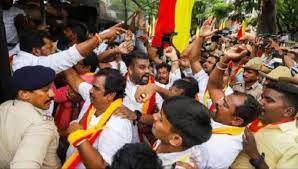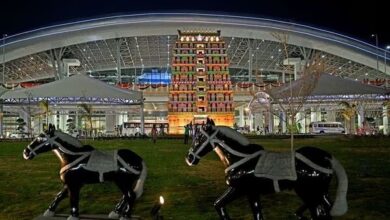Interview with PM Modi at the G20: BJP Praises Visionary Leadership, Oppn Questions Price Rise, Unemployment
In response to Prime Minister Narendra Modi’s comments in an interview with PTI before the G20 meeting, the BJP and the opposition exchanged jabs on Sunday, with the leaders of the governing party praising his vision for the nation and INDIA alliance parties citing concerns about “rising” prices and unemployment.
Prime Minister Narendra Modi said in the interview that the “Sabka Saath Sabka Vikas” model can serve as the compass for the wellbeing of a world moving from a GDP-centric to a human-centric perspective.
No matter the GDP, every voice counts, Modi said in an exclusive interview with PTI that was held late last week at his Lok Kalyan Marg home.
Prime Minister Modi expressed confidence that India would be a developed country by 2047 with “corruption, casteism, and communalism” having no place in our national life. He said that India’s economic progress is a natural by-product of his nine-year-old government’s political stability.
His comments elicited opposing responses from the leaders of the governing party and the opposition.
Rajeev Chandrasekhar, a Union minister, responded to Prime Minister Modi’s statement that “India soon to be in top three world economies” by saying, “There is no doubt in anyone’s mind that India under PM Modi over the last nine years and India’s G20 presidency are big milestones in the country’s rise on the global stage.”
A burgeoning country of 140 crore people, according to Union Minister Dharmendra Pradhan, has benefited from PM Modi’s transformation of the talent pool.
Anil Antony, a BJP politician who had previously been in the Congress, responded to Modi’s claim that “India will be a developed nation by 2047” by claiming that considerably more has occurred in India in the last nine years than in the 67 years since Independence.
However, leaders of the Indian National Developmental Inclusive Alliance (INDIA) criticized the prime minister for his comments and questioned how well the administration had managed to control unemployment and the cost of basic goods.
Ranjeet Ranjan, a Congress member, criticized the prime minister by claiming that while roads are being improved in anticipation of the impending G20 Summit, India’s youth “is asking about employment.” People demand their responses to inflation and frauds, she said.
Sanjay Singh, an AAP member, said that under PM Modi, unemployment rose to its highest level in 42 years and that the cost of petrol and prescription drugs climbed significantly.
According to Congress leader Shobha Oza, unemployment and inflation under the present administration have made life tough for the average person.
She said that Dalits, tribal people, and women had all been victims of atrocities.
TKS Elangovan, the head of the DMK, responded to Modi’s comments that his administration provides political stability by asserting that neither political stability nor harmony now exist in this nation.
In response to Prime Minister Modi’s comments in the interview on combating the problem of false news, RJD MP and spokesman Manoj Jha attacked the BJP, claiming that “the BJP will collapse like a pack of cards if fake news is reined in.”
Vikar Rasool, the head of the Jammu and Kashmir Congress Committee, said that the BJP has not brought about any beneficial changes to the nation and that instead, inflation and unemployment have increased.
The prime minister was praised by BJP leaders for his visionary leadership, nevertheless.
“PM Modi works with an outlook covering the next 25 to 50 years. India will be a developed and independent nation in 2047, when it would have achieved 100 years of independence, according to BJP MP Subrat Pathak.
PM Modi’s evaluation was deemed “solid” by BJP leader Jaiveer Shergill. He also said that “he has laid the vision for the next 40 to 50 years.”
In the interview, Prime Minister Modi said that his administration’s choice to hold G-20 meetings around the nation is an investment in the development of people, cities, and institutions’ capabilities.
He also made fun of prior administrations, claiming that they lacked faith in people’s capacity to host large-scale events outside of the capital in more remote locations.
Invoking his past in organizations, Modi said that he had always had a strong believe in people and that he had gained a lot of knowledge from his experiences at that time in his life.
“India’s G20 Presidency is having a lot of good effects. In the 80-minute conversation with three top PTI staff members, including Editor-in-Chief Vijay Joshi, Modi discussed the G20 and related concerns. “Some of them are very close to my heart,” Modi stated.
While it is true that the G20 is a powerful organization in terms of its total economic power, according to Modi, a GDP-centric perspective of the world is evolving to a human-centric one. Additionally, just as a new global order emerged after World War 2, a new world order is emerging post-Covid.
Globally, the transition to a human-centric strategy has already started, and we are acting as a catalyst. The so-called Third World nations now have more confidence because to India’s G20 presidency, he said.







